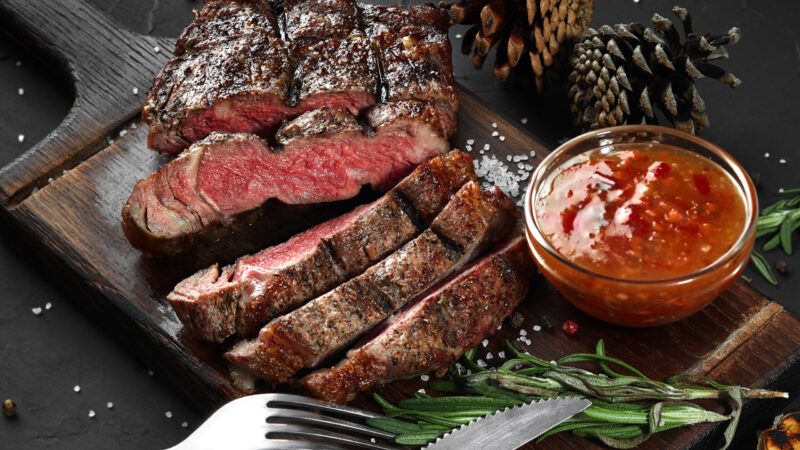Food Freedom Is Coming To Colorado
The state legislature and Gov. Jared Polis are unshackling local ranchers and consumers.

Colorado Gov. Jared Polis (D) is champing at the bit to ensure his state has one of the nation's best food laws. Polis has said he'll sign a bill, Deregulate Meat Sales Direct To Consumers, which will permit farmers and ranchers in the state to sell cuts of meat directly to consumers in the state "without licensure, regulation, or inspection by a public health agency."
The Colorado bill mimics a key expansion of Wyoming's groundbreaking food-freedom law. Last year, Wyoming added an animal-share amendment to that law. As I detailed in a column, the animal-share amendment allows consumers in Wyoming to buy individual cuts of meat, such as steaks or roasts, directly from ranchers. This effectively allows farmers and consumers to opt out of a pervasive federal- and state-run meat inspection system that favors large national and international producers over smaller, local ones.
As I explained last year, Wyoming's law takes advantage of an exemption built into the Federal Meat Inspection Act. While that 1906 law established the processes and parameters for a nationwide scheme of meat inspection, an exemption in the law allows for custom slaughtering of livestock by and for an owner of the animal. Colorado's law will capitalize on that same exemption.
While North Dakota and a few other states have adopted elements of food freedom legislation, Colorado will be the first state to follow Wyoming's lead on animal shares. Colorado's welcome embrace of food freedom should come as no surprise.
In my book Biting the Hands that Feed Us: How Fewer, Smarter Laws Would Make Our Food System More Sustainable and elsewhere, I laud Polis, who was then a member of Congress, for co-sponsoring the PRIME Act, "a bill that would permit farmers to expand options for selling meat locally that's been processed by local slaughterhouses."
In 2015, then-Rep. Polis and Rep. Thomas Massie (R-Ky.) held a publicized lunch at which they consumed steak and other animal products that had not been inspected by the U.S. Department of Agriculture (USDA).
"We think people should be able to go to a farmer's market, and if a farmer there raised cattle and wants to sell it, they should be able to," Polis said of the meal. "In a way, it's restricting capitalism, restricting free enterprise, to say totally legal. You can give [meat] to people, you can share it with people, but the minute there's money involved, it's a federal crime."
That both Polis and Massie continue to live and breathe is evidence that USDA meat inspection is not a necessary precondition for obtaining safe and healthy food. Nevertheless, food safety concerns are front and center for critics of the current Colorado bill.
But, as former Wyoming State Rep. Tyler Lindholm (R)—the chief architect of Wyoming's first-in-the-nation food freedom legislation—told me in 2017, Chicken Little predictions that Wyoming's food-freedom law would lead to illnesses or deaths have proven entirely unfounded.
"Wyoming's local food options have exploded and we still have had 0 foodborne illness outbreaks due to this act passing into law," Lindholm said. "Currently Wyoming has experienced none of the deaths that we were all warned would happen, and for that matter none of the illness[es] that were prophesied to take place upon passage of the bill."
Food freedom's upsides—much unlike its downsides—are very real. In a 2017 column, I listed three key factors that bode well for the spread of Wyoming's food-freedom legislation: "it expands choices for farmers, home-based entrepreneurs, and consumers; it hasn't led to negative food-safety outcomes; and it enjoys bipartisan support."
Polis caught some flak recently for sponsoring a statewide "MeatOut Day." But that's merely a distraction. Polis doesn't want the government to tell you what to eat. Rather, as Polis noted in a great op-ed last month on the importance of food freedom, "one of the values we share is the right to eat whatever we want."
When it comes to food, that's the most important value we can share. Hopefully, other states will soon follow Wyoming and Colorado in protecting that essential American right.


Show Comments (84)